Centre pour la Démocratie, le Développement et la Culture en Afrique
Respect for every individual, for human rights and for democracy is not something that can be set aside in the global fight against COVID-19. It is the key to the solution.
That’s why the Gorée Institute’s Executive Director, Doudou DIA, has joined forces with, NIMD Netherlands NIMD Colombia, Netherlands Helsinki Committee, and the Akina Mama wa Africa to publish a statement on the importance of democracy.
The original statement was posted in international cooperation magazine, Vice Versa. Read it here (in Dutch).
COVID-19 has hit the most vulnerable in developing countries hardest. These people need both medical care and food aid. Worldwide, the response to the Coronavirus pandemic focuses mainly on healthcare and the economy. That is where we need to target our initial efforts, because these areas bear the brunt of the crisis.
Coronavirus does not affect everyone and all sectors equally. COVID-19 drives inequality, amplifying differences and corroding human rights. If things don’t change, once the pandemic has passed we will eventually return to a new normal that is even more inequitable, filled with increased tensions and conflicts. This should be forefront in our minds when dealing with the consequences of the virus.
Coronavirus is not fair. It does not affect all groups equally. Refugees in Greece are anxiously waiting for the virus to infiltrate their camps, while thousands of refugee Venezuelans are sleeping rough at the roadside in Colombia. Health insurance is a rarity in poor countries and, in any event, the poorest of the poor cannot afford to miss out on their uncertain income for even a day. So they must continue to work, sick or not. As long as they have to put food on the table, the disease shall continue to spread.
An excuse for repression
The virus is not a democrat. It is a welcome excuse for repressive measures. In Hungary, the outbreak allowed Orbán to gain more power; while, in Zimbabwe the opposition has been curtailed and demonstrations have been banned due to the virus. Any criticism of the governing party is being suppressed in Bolivia and, in Russia and China, COVID-19 has served as the perfect excuse to further control every part of people’s lives. But more repression leads to more propaganda, instead of an actual decline in COVID-19 related statistics.
The virus has little interest in free media. In several countries – such as Bosnia and Herzegovina, Russia and Romania – freedom of the press has been compromised by measures against the Coronavirus. The virus thrives on these measures, because the media is an effective source of inspiration and ideas. So curtailing the media makes effective solutions harder to find. The quality of health policies relies on criticism and open access to information.
The virus is also a misogynist. Women are on the frontline. In developing countries, they have to take risks by continuing to go to the market, fetch water and care for the sick. So they also get ill. The lockdown has forced small shops in Uganda and many other countries to close their doors. These shops are often run by women who are unable to apply for government assistance because such aid is intended only for large companies operating in the formal economy. Governments that do not include women in their ranks are not sufficiently aware of this: Yet another argument for more women in politics. Inclusive democracy helps.
A major opportunity for political leaders
What the pandemic does do, however, is offer a major opportunity to political leaders who aim to enter into dialogue with the most vulnerable and address all groups in society. Ultimately, if we are to combat the disease successfully, this type of dialogue between politicians and the people is what’s needed.
Understanding the conditions under which the virus thrives will help us find the right way to beat it. The local authorities of Bamako in Mali have recognized the major social and health risks inherent to unequal approach, and have started consulting with the people. They do this, for example, through small-scale social media companies run by young Malians. The aim is to ensure that the population can take an active role in the response to Coronavirus.
Religious communities can lead by example in this respect and also play a binding role. For example, the Cathédrale Saint-Théophile in Kaolack, Senegal, was gifted soap and disinfectant by the city’s imam. The Senegalese authorities are meanwhile providing food aid to the poorest people so that casual labourers are able to adhere to the lockdown.
The lockdown provides the opportunity to show that participatory democracy and open dialogue can lead to jointly supported policies that reduce the spread of the virus and prevent social tensions.
Of course, that is not unique to Mali or Senegal. Governments around the world, as well as the IMF and the World Bank, have rapidly freed up funds to support an emergency response to this sudden and large-scale crisis. The first priority in spending these resources should be fair distribution.
As the Advisory Council on International Affairs (AIV) advised the Dutch Government on 11 May, the Ebola epidemic taught us that ‘local ownership and legitimacy are crucial for combatting a pandemic in local communities‘. This means that it is important to invest in local ownership, using part of the one billion euros that the AIV has proposed the Netherlands should make available to fight the virus.
Listen to the people
We call on the Government of the Netherlands and the EU to see democracy support as an integral part of the response to the Coronavirus.
Governments must, especially in this time of crisis, continue to listen to the people, including the groups that aren’t currently being heard. Think of the poorest of the poor, people in hard-to-reach regions and women. If they are excluded, the strongest players with the biggest influence on political leaders will emerge from this crisis as the winners. That is a recipe for failure, because too many groups will be sidelined, allowing the virus to live on.
A crisis is no justification for undermining democracy. Respect for each individual, for human rights and for democracy is not something that can be set aside in the global fight against COVID-19. It is the key to the solution.
Thijs Berman, Executive Director of the Netherlands Institute for Multiparty Democracy (NIMD)
Doudou Dia, Executive Director of the Institut Gorée (Senegal)
Pepijn Gerrits, Executive Director of the Netherlands Helsinki Committee
Eunice Musiime, Executive Director of Akina Mama Wa Afrika (Uganda)
Ángela Rodríguez, Country Director of NIMD Colombia




